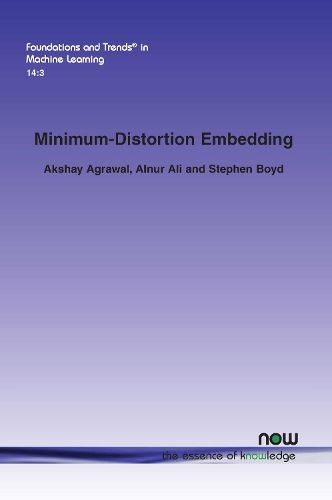Readings Newsletter
Become a Readings Member to make your shopping experience even easier.
Sign in or sign up for free!
You’re not far away from qualifying for FREE standard shipping within Australia
You’ve qualified for FREE standard shipping within Australia
The cart is loading…






This title is printed to order. This book may have been self-published. If so, we cannot guarantee the quality of the content. In the main most books will have gone through the editing process however some may not. We therefore suggest that you be aware of this before ordering this book. If in doubt check either the author or publisher’s details as we are unable to accept any returns unless they are faulty. Please contact us if you have any questions.
Embeddings provide concrete numerical representations of otherwise abstract items, for use in downstream tasks. For example, a biologist might look for subfamilies of related cells by clustering embedding vectors associated with individual cells, while a machine learning practitioner might use vector representations of words as features for a classification task. In this monograph the authors present a general framework for faithful embedding called minimum-distortion embedding (MDE) that generalizes the common cases in which similarities between items are described by weights or distances. The MDE framework is simple but general. It includes a wide variety of specific embedding methods, including spectral embedding, principal component analysis, multidimensional scaling, Euclidean distance problems, etc.The authors provide a detailed description of minimum-distortion embedding problem and describe the theory behind creating solutions to all aspects. They also give describe in detail algorithms for computing minimum-distortion embeddings. Finally, they provide examples on how to approximately solve many MDE problems involving real datasets, including images, co-authorship networks, United States county demographics, population genetics, and single-cell mRNA transcriptomes.An accompanying open-source software package, PyMDE, makes it easy for practitioners to experiment with different embeddings via different choices of distortion functions and constraint sets.The theory and techniques described and illustrated in this book will be of interest to researchers and practitioners working on modern-day systems that look to adopt cutting-edge artificial intelligence.
$9.00 standard shipping within Australia
FREE standard shipping within Australia for orders over $100.00
Express & International shipping calculated at checkout
This title is printed to order. This book may have been self-published. If so, we cannot guarantee the quality of the content. In the main most books will have gone through the editing process however some may not. We therefore suggest that you be aware of this before ordering this book. If in doubt check either the author or publisher’s details as we are unable to accept any returns unless they are faulty. Please contact us if you have any questions.
Embeddings provide concrete numerical representations of otherwise abstract items, for use in downstream tasks. For example, a biologist might look for subfamilies of related cells by clustering embedding vectors associated with individual cells, while a machine learning practitioner might use vector representations of words as features for a classification task. In this monograph the authors present a general framework for faithful embedding called minimum-distortion embedding (MDE) that generalizes the common cases in which similarities between items are described by weights or distances. The MDE framework is simple but general. It includes a wide variety of specific embedding methods, including spectral embedding, principal component analysis, multidimensional scaling, Euclidean distance problems, etc.The authors provide a detailed description of minimum-distortion embedding problem and describe the theory behind creating solutions to all aspects. They also give describe in detail algorithms for computing minimum-distortion embeddings. Finally, they provide examples on how to approximately solve many MDE problems involving real datasets, including images, co-authorship networks, United States county demographics, population genetics, and single-cell mRNA transcriptomes.An accompanying open-source software package, PyMDE, makes it easy for practitioners to experiment with different embeddings via different choices of distortion functions and constraint sets.The theory and techniques described and illustrated in this book will be of interest to researchers and practitioners working on modern-day systems that look to adopt cutting-edge artificial intelligence.